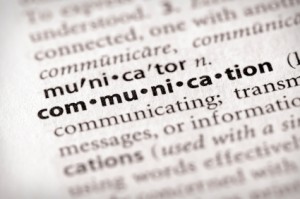 Let me ask you…do you think you need to improve your communication skills?
Let me ask you…do you think you need to improve your communication skills?
Whether you realize it or not, words you use in conversations make a difference.
Subtle changes in the words you use will improve your communication skills immensely. Words can make the other party defensive or open to further conversation. They can create positive results or leave conversations dangling. If you want to improve your communication, start with changing the words you use.
Let’s take a look at some examples that will help you to improve your communication skills:
Take the word but. I led a workshop recently and in the course of 15 minutes I counted but being used 25 times by 7 different people. We don’t even realize how frequently we use this word.
Consider the sentence I’m very excited about the opportunity but realize it will be a real challenge. Or I love the design you created but wonder what it would look like in yellow. Or I wish you’d follow your instincts more often but I can always count on you to come through. The word but is negative. It negates everything that is said before it, even if that was not the intended meaning. Think about how it changes the sentences if you say I’m very excited about the opportunity AND I realize it will be a real challenge. Or I love the design you created AND wonder what it would look like in yellow…you get the drift.
Shifting that one little word from but to and changes how people hear and relate to what comes afterward.
The words maybe, probably and most likely are other culprits.
Anytime someone uses one of those words it means you can’t count on them, they aren’t committed. It’s a shallow promise but we often take it as acceptance that they have agreed. I grew up with a father who used maybe all the time. It took me a long time to learn that when he said maybe he really meant no. Taking these words out of your vocabulary will improve your communications skills. You’ll say yes and be committed, say no, or explain under what circumstances you can say yes. Clear, concise and accurate.
Here’s the granddaddy of all words to remove from your vocabulary: OK.
In the same workshop I mentioned earlier, I asked the group this question: “If I say to my husband, ‘Honey, will you vacuum the house this weekend?’ and he says, ‘OK,’ how many of you think he is going to vacuum?” More than two-thirds said he would! Amazing! The only thing I know for sure is that he heard me speak. I don’t know if he heard the question, agreed to vacuum or even that he knows what I mean by ‘the house’…is that only carpeted areas, is it all levels? It’s so easy to assume when we say or hear OK that the person understands and has committed.
Little shifts in the words you use can make a huge difference and improve your communication skills.
This week I challenge you to track how often you hear others use the words but, OK, or maybe/probably/most likely. Each time you catch yourself using the word but, change it to and. You’ll be surprised at how simply changing that one word changes the conversation.

Which Type of Communicator Are You?
Take the quiz and find out your communication style.
You will better understand how your communication style impacts your results at work.





